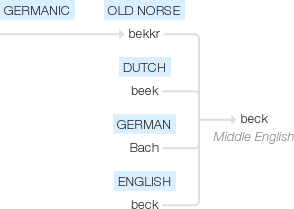Beck
Middle English: from Old Norse bekkr, of Germanic origin; related to Dutch beek and German Bach . Used as the common term for a brook in northern areas, beck often refers, in literature, to a brook with a stony bed or following a rugged course, typical of such areas.
wiktionary
From Middle English bek, bekk, becc, from Old Norse bekkr(“a stream or brook”), from Proto-Germanic *bakiz(“stream”).
Cognate with Low German bek, beck, German Bach, Dutch beek, Swedish bäck, Old English bæc, bec, bæċe, beċe(“beck, brook”). Doublet of batch. More at beach.
From Middle English bekken, a shortened form of Middle English bekenen, from Old English bēcnan, bēacnian(“to signify; beckon”), from Proto-West Germanic *baukn, from Proto-Germanic *baukną(“beacon”). More at beacon.
See back.
From Middle English bec, bek, from Old French bec(“beak”),
etymonline
beck (n.)
late 14c., "nod or other mute signal intended to express desire or command," a noun use from Middle English bekken (v.), variant of becnan "to beckon" (see beckon). Transferred sense of "slightest indication of will" is from late 15c.
beck (v.)
"to signal by a nod or gesture," c. 1300, shortening of beckon. (v.).
